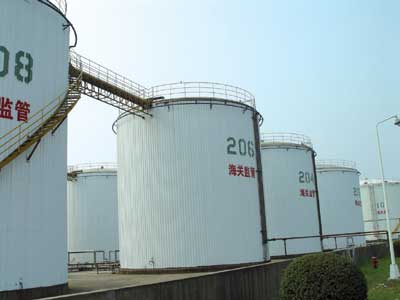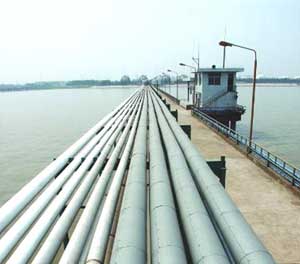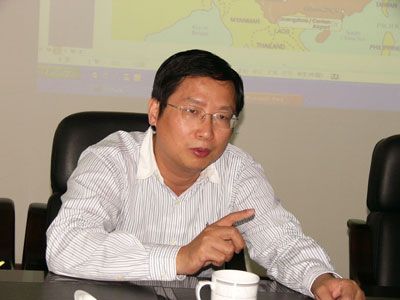
The 44-year-old CEO of Hengyang Petrochemical Logistics was sharing insights into China's young chemical industry during a recent meeting with NextInsight.
Hengyang debuts today on Catalist at IPO price of 38 cents, or 7.2 times FY08 earnings.
Some investors may consider this pricey for an S-chip, but Mr Gu is convinced of the chemical logistics player’s earnings quality.
The company’s 37 static (landed) tanks rented to dominant petrochemical players like SINOPEC and BP for storing aggressive chemicals has been highlighted in recent media reports.
Its customer base of over 60 petrochemical products manufacturers and distributors is wide and stable, said the management.
What I also found interesting was the fact that it provides logistics services for well over 30 types of petrochemicals, thereby decreasing top line exposure to any single sector.
Virtually every industry requires chemicals in one way or another, ranging from plastics, fibers to synthetic rubbers and more.
This means that in general, the growth rate in the chemical industry tracks global economic growth.

These range from inks and paints, pharmaceuticals, fertilizers to plastics and cellulose, to name but a handful of its diverse industrial applications.
Secondly, while one may consider Hengyang’s net margins of 31.5% (1H09) to be fat, that is the industry norm as there is high demand for chemical storage, said Mr Gu.
He pointed to the 30.5% margin netted in 2Q09 by Zhangjiagang Freetrade Science and Technology (600794.SH), a billion-yuan chemical logistics player listed on the Shanghai bourse, as another example.
Margins will expand for Hengyang when it starts operating its own chemical jetties, he adds.
Hengyang is one of 20 to 30 mid-sized chemical logistics players in Jiangsu, and has clear plans to expand its facilities on home ground as well as further upstream of the Yangtze River.

This will be funded by cash flow from operations and will increase storage capacity by 43% to 139,600 cubic meters.
Its IPO's net proceeds of S$4.5 million (Rmb 22 million) will be used to partially fund the construction of storage facilities at Deqiao, which is across the Yangtze River on the Jingjiang bank facing its existing facilities.
The management’s vision is to increase storage facilities by four to fivefold. This however, is subject to availability of external funding as storage tanks do not come cheap.
Phase One of the facility at Deqiao will cost Rmb 240 million for 42 tanks, an office building, a new jetty and land use rights.
Bank loans of Rmb 120 million have already been secured for this and the management expects existing capacity to increase two to threefold to 265,600 cubic meters by 1Q10.
 NextInsight
a hub for serious investors
NextInsight
a hub for serious investors
HENGYANG: Lucrative chemical logistics player is today's IPO
- Details
- Sim Kih
Hengyang's land use rights booked at cost are much lower than market value, says CEO Gu Wenlong. Photo by Sim Kih
Hengyang's high end tanks come with temperature control and DCS system for remote monitoring by customers of data on chemicals stored.
Pipes need to be laid from the jetty to the static tanks.
You may also be interested in:

|
HENGYANG PETROCHEMICAL: Macquarie Everbright unit injects S$54.25m |

|
HENGYANG PETROCHEM: Photo essay of petrochem logistics facilities in China |

|
HENGYANG: To be Yangtze River’s first chemical logistics chain |
